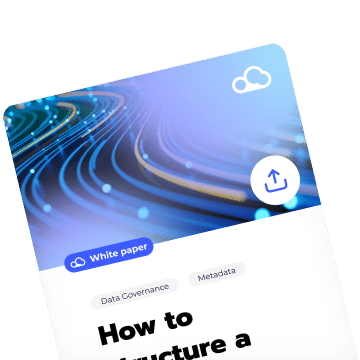
Data catalog vs. Business Glossary vs. data dictionary
Creating a data culture has become a must for organizations heading into 2023, and the first step is to stock up on the necessary tools. But it is easy to get lost! Between data catalogs, business glossaries, and data dictionaries, there are a lot of terms to learn to get around.
Here is an overview of these three critical tools’ key characteristics and differences.
Similar but very different concepts
Data catalogs, Business Glossaries, and Data Dictionaries are three terms that are often used interchangeably, but they are quite different from one another. Understanding the differences between these three terms is important for any organization looking to get a better handle on its data.
Despite their similarities, the business glossary, the data dictionary, and the data catalog are used in different ways, and each has its unique strengths and use cases.
What is a Business Glossary?
The business glossary is the starting point for organizations looking to implement data governance. The business glossary provides definitions of concepts particular to each company’s departments and serves as an all-in-one source of business terminology information for everyone.
What is a data dictionary?
More technical than the business glossary, the data dictionary provides in-depth information on the company’s data assets. It includes descriptions of each data item’s attributes, such as the data type, length, default values, relationships with other data, and more. Typically, implementation requires a more advanced data governance policy than the business glossary does.
What is a data catalog?
The data catalog is the ultimate source of data knowledge within the organization, and its implementation usually requires a business glossary and a data dictionary. It links the company’s data assets, including the business glossary and data dictionary, allowing for better organization and access.
Advantages and limitations of each tool
Because it is meant for a broader audience within the organization, the main advantage of the business glossary is that it is more accessible and easier to grasp. As a result, it does not necessitate the investment in a sophisticated infrastructure to be employed. Be careful, however, to ensure that it is correctly completed, tracked, and updated to prevent misleading or incorrect information.
The data dictionary is intended for more specialized use, so it will most likely be of interest to technical profiles and data specialists. It is designed in a more visual format with tables and diagrams, but it is less easy to understand than the glossary, which describes concepts with words. It is more expensive and must be automated for optimal use.
Finally, the data catalog bridges the gap between its two counterparts, simplifying access to all forms of data and allowing for structured browsing of all the organization’s data. While a data catalog reduces risk and improves efficiency and analysis, its development requires technical skills that are in very short supply and in high demand.
Conclusion: 3 key tools for a data-driven organization
These data stack tools provide a single source of truth that all stakeholders can use to understand and access data quickly and accurately. They enable organizations to make the most of their data by giving them the ability to organize, manage, and search for data in a way that optimizes its value.
With data catalogs, data dictionaries, and business glossaries, organizations can identify, locate, and understand the data that is available to them, as well as ensure that the data is reliable and accurate.
By leveraging these tools, organizations will be able to utilize their data better to drive business decisions and strategies, achieve greater operational efficiency, and stay competitive in the digital age.
—
Learn even more about creating an intuitive data catalog to fit your needs! Sign up for a demo of DataGalaxy’s Data Catalog 360°, an all-in-one Data Catalog that offers out-of-the-box actionability with fully-customizable attributes, powerful visualization tools, standardized business glossaries, and AI integration to help organizations easily document, link, and track all their metadata assets on one dynamic platform.
Are you ready to unlock the full value of your data? Start today for free!




